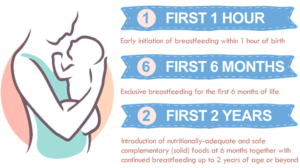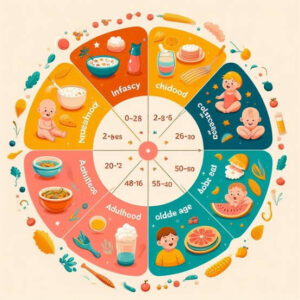Nutrition for different life stages: How your diet changes as You Age
Through the journey of life, our nutritional needs changes. What we eat plays a crucial role in supporting our growth, development, and overall well-being at every stages of life. There are various guide to nutrition for different life stages and this write up will guide through it all:
Starting with infants [i.e 0-12months]: Exclusive breast-feeding is adviced for at least 6months or formula provides essential nutrients. Introduce semi solid and solid foods at 6 months, focusing on iron-rich and single-ingredient purees, also gradually increase food variety and texture.

Toddlers [1-3years] : It is advised to continue breastfeeding or formula feeding, offfer a balanced diet with protein, healthy fats, and complex carbohydrates and also encourage self-feeding and exploration of new foods. This helps in the growth and development of a child and also how active the child will be.
Moving on to childhood [4-12years]:Emphasis is placed on whole foods, fruits, vegetables, whole grains, lean proteins, and low-fat dairy. Limiting sugary drinks, fast food, and processed snacks in diet and support growth and development with adequate calcium and vitamin D and other essential micronutrients.
Adolescence (13-18 years) :¬This is the stage of life that is between childhood and adulthood. During this period individuals experience different changes ranging from physical to emotional and social changes as they transition from childhood to adulthood. These changes includes menstruation in female, hormonal changes, brain development and so on. As this transition is occurring, so also the need for a balanced diet. There is increased need for energy giving foods, also focusing on iron, Zinc and calcium for growth and development. Healthy habits, such as regular meals and mindful eating should be encouraged.
Adulthood (19-64 years) :¬This is another phase of life where whole, unprocessed foods for optimal health are prioritized. Maintaining a balanced diet with protein, healthy fats, and complex carbohydrates is essential. Also addressing specific needs, such as iron, calcium, and folate in women and vitamin D, magnesium, and zinc in men.
Older Adulthood (65+ years) :¬This is the last phase of life and considering age-related changes, emphasis is placed on nutrient dense foods. In this phase, there is decreased digestion and absorption of foods and high risk of chronic diseases, therefore it is important to focus on Calcium and vitamin D for bone health, omega-3 fatty acids for heart health¬† and fiber and fluids for digestive health.

On the next write up: we will be talking on pregnancy and lactation phase. To know more about exclusive breast-feeding please click on the link below:
Also read on : Eating Disorder and Nutritional Management





Leave a Reply